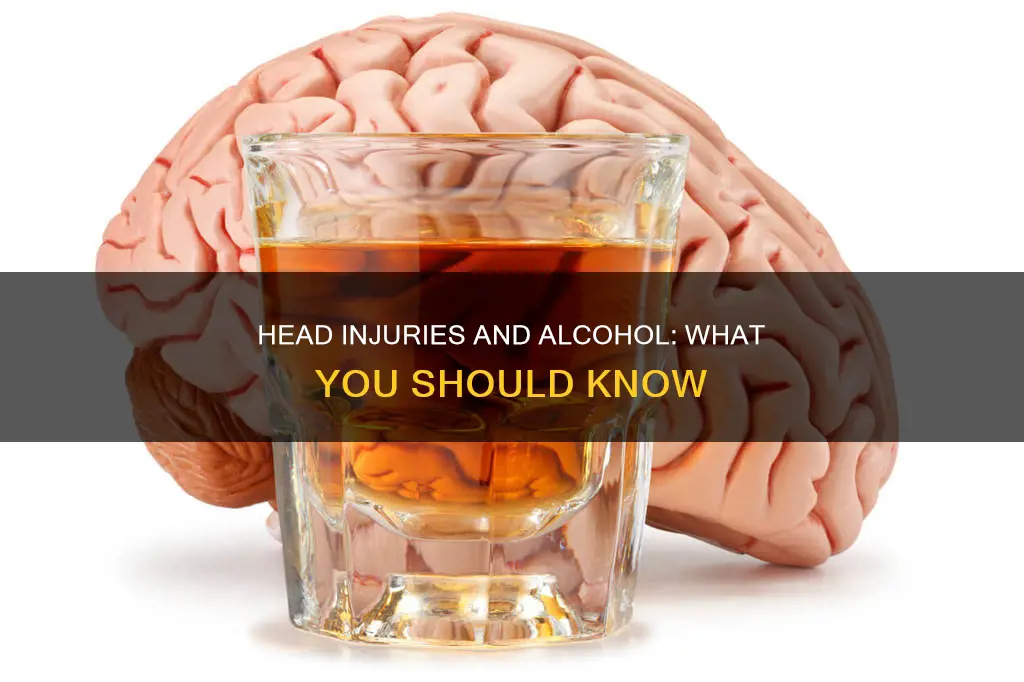
Drinking alcohol after hitting your head is generally not recommended, especially if you have suffered a concussion or traumatic brain injury (TBI). Alcohol is a central nervous system (CNS) depressant, slowing nervous activity in the brain and impairing normal functions such as inhibition, motor control, and sleep. This can increase the risk of further injury, cognitive problems, emotional issues such as depression, and seizures. While there is no definitive evidence that alcohol impedes recovery from mild to moderate TBIs, it is still advised to refrain from drinking until fully healed to promote optimal recovery and reduce the risk of negative outcomes.
| Characteristics | Values |
|---|---|
| Drinking alcohol after hitting your head | Not recommended |
| Alcohol's effect on the brain | Alcohol is a central nervous system (CNS) depressant; it slows down nervous activity in the brain |
| Alcohol and brain injuries | Alcohol can slow down recovery from a brain injury; it can also increase the risk of another injury |
| Alcohol and seizures | Alcohol lowers the seizure threshold and may trigger seizures |
| Alcohol and mental health | Alcohol can worsen mental health issues such as depression and cognitive problems |
| Alcohol and physical health | Alcohol can cause physical symptoms such as headaches and sleep disturbances |
| Alcohol and gut health | Alcohol can cause a "leaky gut" and persistent inflammation |
| Alcohol and medication | Alcohol can interact with certain medications, reducing their effectiveness or increasing their effects |
| Alcohol and addiction | Alcohol dependence or addiction can make it difficult to stop drinking after a brain injury |
What You'll Learn

Alcohol can slow down recovery from a head injury
Alcohol consumption is known to slow down the recovery process from a head injury. Firstly, alcohol disrupts the balance of neurotransmitters, which are essential for brain cell repair after a concussion, potentially delaying the healing process and leading to longer recovery periods. The depressive effects of alcohol on the central nervous system can also impair cognitive functions, affecting abilities such as memory retention and problem-solving during the recovery phase.
Drinking alcohol after a head injury can also exacerbate concussion-related sensitivity to light, causing further discomfort in bright environments. Additionally, alcohol consumption can worsen headaches, adding to the physical discomfort and hindering recovery efforts. Alcohol's interference with the normal sleep cycle can prevent the brain from entering the deep, restorative stages of sleep needed to heal from neurological injuries.
Furthermore, alcohol consumption increases the risk of seizures following a head injury, as it lowers the seizure threshold. This is particularly concerning as seizures can exacerbate existing brain damage and complicate the recovery process. Alcohol consumption can also increase the risk of falls and secondary injuries due to impaired coordination and judgment, potentially leading to further brain damage.
Overall, alcohol consumption during the recovery from a head injury can negatively impact the healing process, prolong recovery times, and increase the risk of further injuries and complications. It is crucial to follow medical advice and refrain from alcohol consumption to optimize the recovery process and prevent additional complications.
The Beer Droid: Brewing Process Decoded
You may want to see also

Drinking after a head injury can increase the risk of another injury
Drinking after a head injury can have severe adverse effects on your health and well-being. Alcohol consumption during the recovery phase can significantly disrupt the healing process and lead to longer recovery times. Here are some reasons why drinking after a head injury increases the risk of another injury:
- Impaired Coordination and Judgment: Alcohol consumption can impair coordination and judgment, increasing the risk of falls and secondary injuries. This is especially dangerous for individuals recovering from a head injury, as further trauma to the brain can have severe consequences.
- Increased Risk of Seizures: Traumatic brain injuries put survivors at risk for developing seizures. Alcohol lowers the seizure threshold, making it more likely for seizures to occur. Consuming alcohol after a head injury can trigger seizures and exacerbate existing brain damage.
- Worsened Cognitive Impairments: Drinking alcohol after a head injury can worsen cognitive impairments caused by concussions, making it more difficult to concentrate, process information, and make decisions. The depressive effects of alcohol on the central nervous system can severely impair cognitive functions, including memory retention and problem-solving.
- Prolonged Recovery Times: Alcohol can interfere with the natural healing process of brain cells, resulting in prolonged recovery times from concussion symptoms. It disrupts the balance of neurotransmitters essential for brain cell repair, potentially delaying healing and extending recovery periods.
- Risk of Risky Behaviors: Alcohol consumption can increase the likelihood of engaging in risky behaviors, further elevating the chance of accidents and new injuries. This is particularly concerning for individuals with head injuries, as they are already more vulnerable to trauma.
- Adverse Effects on Brain Health: Alcohol is a neurotoxin, which means it has the potential to damage brain cells. When combined with the effects of a traumatic brain injury (TBI), even moderate alcohol consumption can negatively impact the healing process.
- Interference with Sleep Cycles: Alcohol's disruption of normal sleep cycles can prevent the brain from entering the deep, restorative stages of sleep necessary for healing from neurological injuries.
It is crucial to follow medical advice and give your brain adequate time to heal after a head injury. Consult with a healthcare professional before considering alcohol intake, and always prioritize your health and well-being.
Beer and Aleve: A Safe Mix?
You may want to see also

Alcohol can increase the severity of a concussion's after-effects
Drinking alcohol after a concussion is not recommended, as it can negatively impact the brain's recovery process and increase the severity of symptoms. Here's how:
Impaired Recovery
Alcohol can disrupt the brain's natural recovery process and impair cognition. It can interfere with the brain's ability to repair itself, potentially prolonging the recovery time. The brain needs adequate rest and time to heal, and alcohol consumption can hinder this process.
Increased Severity of Symptoms
When alcohol is introduced after a concussion, it can amplify the symptoms associated with the injury. This includes an increase in dizziness, headaches, and other post-concussion symptoms. The presence of alcohol in the system can make these symptoms more pronounced and intense.
Heightened Sensitivity to Alcohol
During the recovery from a concussion, individuals may experience a heightened sensitivity to alcohol. This means that even a small amount of alcohol may affect them more significantly, leading to higher levels of intoxication. This heightened sensitivity can further impair coordination and balance, increasing the risk of falls and additional injuries.
Risk of Re-injury
The combination of a concussion and alcohol consumption can elevate the risk of sustaining another head injury. Alcohol can affect coordination and balance, similar to the effects of a concussion. When these effects are combined, the risk of accidents, falls, or further head trauma increases. Sustaining another brain injury before fully recovering from the initial concussion can lead to permanent brain damage.
Negative Impact on Mental Health
Concussions can have a significant impact on mental health, and alcohol consumption can exacerbate these issues. Alcohol is a depressant, and its consumption can cause or worsen depression. It can also affect memory and thinking flexibility, magnifying the cognitive problems caused by the concussion. The negative mental effects of alcohol can last for days or even weeks after drinking stops.
Increased Risk of Seizures
Traumatic brain injuries put survivors at an elevated risk of developing seizures or epilepsy. Alcohol consumption further lowers the seizure threshold and may trigger seizures. Abstaining from alcohol can help reduce this risk and promote overall brain health.
Interference with Sleep Quality
Alcohol consumption can disrupt sleep quality, which is crucial for the full recovery from a concussion or traumatic brain injury. Poor sleep can hinder the healing process and prolong symptoms.
In summary, alcohol consumption after a concussion is not advisable due to its potential to increase the severity of symptoms, impair recovery, and elevate the risk of re-injury. It is essential to prioritize the brain's healing process and avoid activities that may hinder it, including consuming alcohol.
Tongue Piercing and Beer: What's Safe?
You may want to see also

Alcohol can negatively impact mental health
While drinking beer after experiencing a head injury is generally discouraged, it is not explicitly prohibited. However, it is important to note that alcohol consumption can negatively impact mental health.
Alcohol is a depressant, which means it slows down the brain. It changes the chemical makeup in the brain, affecting memory and other cognitive functions. This can lead to increased risky behaviour, aggression, unsafe sex practices, and self-harm or suicidal thoughts, especially in those already facing challenges with their mental health. Binge drinking, or consuming a large amount of alcohol in a single session, can further exacerbate these negative effects.
Alcohol can also worsen symptoms of mental health conditions such as depression and anxiety. While people with these conditions may turn to alcohol to self-medicate or ease their symptoms, excessive alcohol use can have the opposite effect, worsening depression and anxiety over time. Additionally, alcohol dependence can lead to social problems such as homelessness, job loss, divorce, and domestic abuse, all of which can further negatively impact mental health.
Furthermore, alcohol increases the risk of concussions and other head injuries. It impairs normal inhibition, alters motor control, and disrupts sleep, all of which contribute to a higher risk of sustaining a head injury. This is particularly concerning as repeat concussions pose significant risks and can have severe consequences for brain health and overall well-being.
Therefore, it is advisable to refrain from drinking alcohol, especially when recovering from a head injury, to optimise recovery and maintain mental health.
Beer O'Clock: When Work Lunches Need a Lift
You may want to see also

Alcohol can cause dehydration, which may lead to headaches
Alcohol consumption is not recommended after a concussion or traumatic brain injury (TBI). Alcohol can negatively affect the recovery process, increase the risk of another injury, and worsen symptoms such as cognitive problems and depression.
Now, regarding the relationship between alcohol and dehydration, and how this can lead to headaches, here is some information on that:
Alcohol can cause dehydration, which occurs when the body loses too much fluid and electrolytes. Dehydration can lead to a range of negative effects, including headaches. Drinking alcohol causes the kidneys to excrete more fluid, resulting in excessive urination and dehydration. This dehydration can cause a shift in fluid levels in the brain, stimulating pain receptors and leading to a headache. The exact mechanism behind dehydration-induced headaches is still not fully understood, but it is believed that the pain may be triggered by receptors in the meninges, the lining surrounding the brain.
The risk of dehydration headaches is higher in individuals with lower body weights, as they cannot process large amounts of alcohol. Additionally, certain ingredients in alcoholic beverages, such as ethanol and congeners, can also trigger migraine attacks. Ethanol is a vasodilator, which increases blood vessel size, while congeners are chemicals that may stimulate migraine headaches.
To prevent dehydration-induced headaches, it is crucial to stay hydrated by drinking plenty of water before, during, and after alcohol consumption. It is recommended that males aim for two or fewer drinks per day, while females should limit themselves to one or fewer.
In summary, alcohol consumption can lead to dehydration, which is a common trigger for headaches. By understanding the relationship between alcohol, dehydration, and headaches, individuals can take proactive steps to stay hydrated and potentially reduce the occurrence of these types of headaches.
The Science Behind Foam Beer Koozies: Do They Work?
You may want to see also
Frequently asked questions
It is not recommended to drink beer or any other alcoholic beverage after hitting your head, as it may slow down your recovery and increase the risk of another injury.
Drinking alcohol after a head injury can increase the severity of symptoms such as dizziness and headaches, and may also trigger seizures. It can also affect your coordination and balance, increasing the risk of falls and further injuries. Additionally, alcohol is known to worsen cognitive problems and increase the risk of depression.
It is recommended to refrain from drinking alcohol until all symptoms of the head injury have resolved and you have consulted with a doctor for a final assessment. Even after that, it is important to gradually reintroduce alcohol and monitor how you feel, as the effects of a brain injury can linger without noticeable symptoms.







